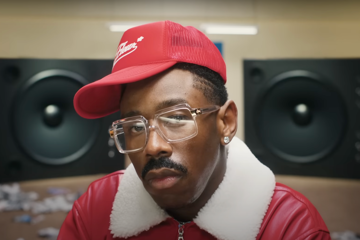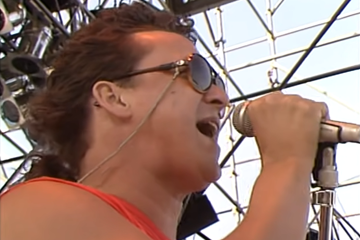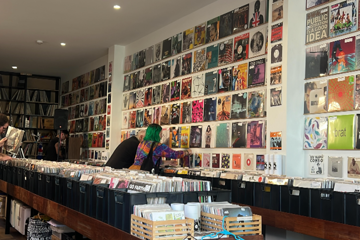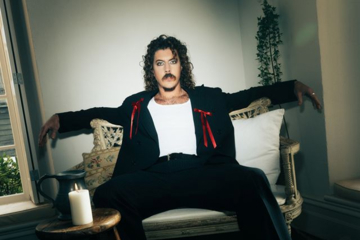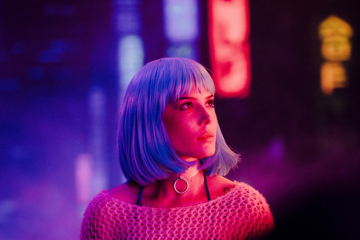Life Through The Lens
"I don’t know how much I ever really understood the weight of my family background."
When Gia Coppola first met James Franco, in 2010, she just wanted to ask him about Freaks & Geeks. “That's how James and I initially bonded,” she says. “I was such a fan of that show, so that was the easiest thing for us to talk about.”
Coppola was 23, a photographer freshly graduated from art school cutting her film biz teeth working on the crews for films by her aunt, Sofia (Somewhere), and grandfather, Francis Ford (Twixt). Franco had just written a book of short stories named after, and set in, his hometown, Palo Alto, chronicling the wanton cruelty and “emotional aimlessness” of affluent teenagers, and was looking for someone to adapt it to the screen.
“When I read it I was really taken by it, because it felt really authentic; it really felt like high school. I always felt very frustrated by [the way] movies and TV shows never depicted teenagers that felt authentic; the actors were always, like, 25 and super-confident, always wearing fancy, clean new clothes, and their hair and skin was always perfect. To me, those don't feel like people, those feel like clichés. I found much more to admire in The Last Picture Show or American Graffiti, where the characters felt very complex, very human.”
The daughter of eldest Coppola sibling, Gian-Carlo, who died in a boating accident before her birth, Gia didn't grow up steeped in that cinematic lore. “I don't know how much I ever really understood the weight of my family background. For a long time I wasn't allowed to see their movies, and then when I was older they didn't really want to watch them with me. I never felt any pressure from my family, it was from outside people. Everyone would ask me what I wanted to do, whether I was going to be a filmmaker, and I felt discouraged from getting into filmmaking because of that.”
Don't miss a beat with our FREE daily newsletter
Yet, spending long stints on the Coppola family vineyard in California, where Francis Ford would, eventually, shoot the entirety of Twixt, it wasn't hard to be swept up in the romantic stories of Aunt Sofia and Uncle Roman's salad days. “I always longed for the childhood that my dad, my uncle and my aunt had. They travelled with my grandpa, and grew up working on movies sets. I wasn't allowed to do that. I had to stay in high-school. I was always begging to leave school to go travel, but my grandpa wasn't really making movies that much as he got older, and he really wanted me to have a traditional high-school education.”

Palo Alto
That traditional high-school education didn't sit so well with Gia – “I really struggled in high-school, academically,” she sighs. “It was really disheartening to always get really bad grades.” Perhaps inevitably, she was drawn behind the lens.
“I had my dad's camera, and it meant so much to me. I knew that he loved that, that it meant so much to him, so to use it was a way to get close to him, to understand him. And I think I always felt comfortable behind the camera. Not like I was so good or that it instantly came to me, photography, more just that it felt good to be there, to be shy behind the camera. It meant I could work with people and connect with people that I'd otherwise be way too shy to ever talk to.”
At Bard College, Coppola was mentored by Stephen Shore (“I really liked his idea that you can take everyday things around you – like your dinner-plate on a counter, or your friends – and find beauty in these mundane things”) and feels her studies present in Palo Alto, her debut feature a portrait of suburban ennui and self-destructive adolescent angst that's beautifully photographed and filled with lingering melancholy. “I wanted to be able to compose a frame, as opposed to getting in the face of my actors with some shaky-camera effect.”
Palo Alto's actors include fellow children-of-celebrity Emma Roberts and Jack Kilmer, plus Kilmer's dad, Val, and there's a creepy, smarmy turn by Franco himself. It's been compared to Aunt Sofia's The Virgin Suicides, but where that film chronicles memory's warping qualities and the projection of fantasies onto others, Palo Alto is about teenagers acting out roles, living out the clichés expected of them.
“When you're young, you often say things that you feel like you're supposed to say, that aren't necessarily how you really feel. I remember that feeling, and doing that, and years later, when you've worked out who you are and what you believe in, it's so painful to think of yourself like that. For years it was real hard for me to go back to that place. I think I'm only really old enough, now, to appreciate that time for what it was.”

